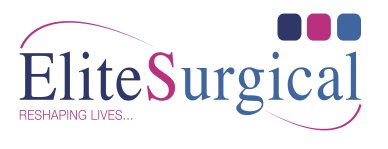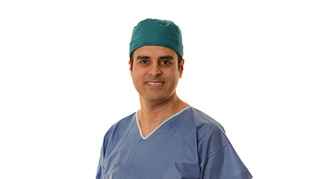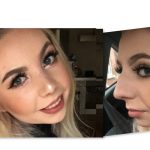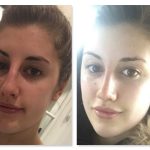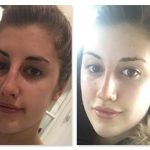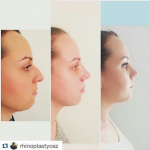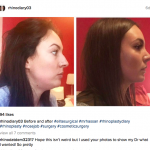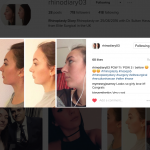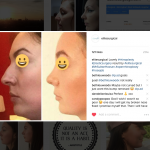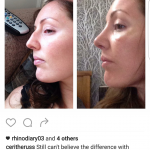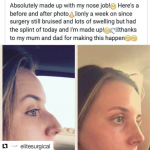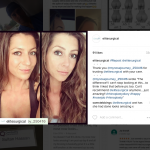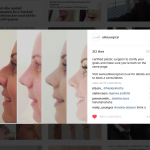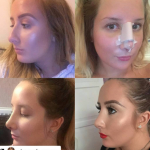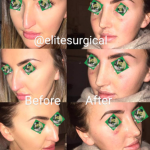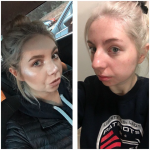Rhinoplasty (Nose Job)
A nose job or rhinoplasty is a procedure used to reshape the nose. It involves reshaping the cartilage and often the bony framework of the nose in order to change its appearance. During rhinoplasty surgery the shape of the nose tip, the bridge and also the nostrils (alar base reduction surgery) can be changed as can the angle between the nose and the upper lip. Sometimes breathing difficulties can also be corrected at the same time. A nose job or rhinoplasty can also be combined with surgery to restore facial proportion such as chin surgery by using a chin implant to augment a small chin or even chin reduction surgery for a more protruding chin.
There are many different reasons for opting to have a nose job or a rhinoplasty surgery. A nose job can be effective in solving problems related to sinuses, snoring and breathing. Apart from this, Rhinoplasty is the only way to fix a broken nose and bringing it back to its near normal appearance. You can opt for nose job to make your nose look longer, shorter, thinner, straighter or to give it a smooth profile. Whatever your reason might be, rhinoplasty can help you look younger, change your appearance and boost your confidence.
There are different approaches to conduct nose job surgery or rhinoplasty surgery, which includes open rhinoplasty or closed rhinoplasty. Endonasal rhinoplasty or closed rhinoplasty is done for minor reshaping normally to reduce a simple bump or hump on the nose bridge; where incisions are made inside the nostrils, hence visible scarring can be avoided. The bone and cartilage are separated and then can be reshaped, rearranged, or removed to achieve the desired look. In external rhinoplasty or open rhinoplasty, the incision is done along the columella, thus giving greater access to cartilage and bone. Although this type of surgical approach leaves almost negligible scars behind, it is ideal for all those who need accuracy and major changes in their nose.
In most cases, rhinoplasty surgery can take around two to three hours under general anaesthesia. You may be able to go home on the same or the next day. Post-surgery, you may experience some minor bleeding from your nose for the first day or two after your operation. Keep your head up as much as possible and avoid having hot baths. You can shower immediately and wash your hair, but wash with head backwards to avoid getting the splint wet. You might feel uneasiness and a moderate amount of pain, which can easily be controlled with medication. The uneasiness and pain will start decreasing within a few hours of the surgery. You might encounter bruises and swelling after the surgery, but they will gradually reduce thereafter. If you experience unusual amount of bleeding, increase in pain or fever, then you should contact your hospital and your doctor immediately, however this is very rare.
The results of the rhinoplasty surgery, can very much depend on how good a person takes care of themselves. A regular smoker must stop taking any of these for at least 4 weeks before and after the surgery. Patients should take medications prescribed by their surgeon and should not take aspirin without consulting with surgeon. Post-surgery, the patient should try to avoid wearing glasses for six weeks and sleep with the head elevated for the first few weeks. It is important to avoid direct contact with the sun or use a good quality sunscreen lotion (SpF 50), if going out in sun is unavoidable. Patients must try avoiding any type of physical exertion for minimum 3 weeks, or squeezing their nose. Avoid exercise, heavy lifting, swimming or going to the gym for six weeks. Avoid long haul (>3hrs) for the first three to four weeks after any surgery.
A protective splint will need to be worn over your nose for at least a week. Stitches inside your nose will be dissolvable and will not need to be removed. Any non-dissolvable stitches will be removed after six or seven days.
The outcomes of your surgery depend on you, your body, your protective measures – so how you look after yourself and also the skill of your surgeon! If you are ready for rhinoplasty surgery, then book your consultation with one the UK’s best cosmetic and plastic surgeons, Mr Sultan Hassan. During your consultation, that will always be face to face with your surgeon, all aspects of your surgery will be discussed in detail, to ensure you get the best results.
“A good result for you is a great result for us,” Mr Sultan Hassan, Consultant Plastic Surgeon, Elite Surgical.
A nose reshaping operation involves separating the soft tissue that lies on top of the nose from the bone and cartilage underneath. The nose bone may be broken and repositioned or the cartilage may be reshaped.
This operation narrows the width of the nose. If the nostrils then seem too wide, it is possible to narrow them as well by cutting out a small piece of skin in the floor of the nostril which would leave a fine scar on each side. It is also possible to shorten the nose and to slim down a bulky tip by reducing the amount of cartilage which shapes the end of the nose. If you have difficulty breathing through your nose, it may be possible to improve this at the same time by adjusting the lie of the plate of the bone which separates one half of your nose from the other. This is referred to as a Septoplasty.
| Operation Time | 2-3 hrs |
| Anesthesia | general |
| Nights in hospital | 1 |
| Common Risks | bruising, swelling, temporary numbness, temporary skin irregularity |
| Uncommon Risks | infection, excessive scarring, asymmetry, bleeding, permanent numbness, airway narrowing |
| Pain and discomfort | 3 – 7 days |
| Follow-up after surgery | 1 week, 3 months |
| Time off work | 1 – 2 weeks |
| Sports | 2 weeks – walking |
| 4 weeks – jogging | |
| 6 weeks – everything | |
| Result | 12 weeks until final result scars continue to improve over 18 months |
What happens at my first consultation?
During your consultation it is very important that you fully discuss the the pros and cons of your procedure. Your surgeon will discuss the procedure in full including the risks involved and the likely outcome. Your surgeon will also discuss whether or not you are suitable for a rhinoplasty.
What should I look for when choosing a surgeon?
You should ensure that the surgeon has all the relevant qualifications and accreditation.It is also important to establish just how many procedures the surgeon has carried out. Our surgeon is UK accredited and is a fully-qualified GMC registered Consultant Plastic, Cosmetic Surgeon, he is a member of the British Association of Aesthetic Plastic Surgeons (BAAPS) in addition to being a member of the British Association of Plastic, Reconstructive and Aesthetic Surgeons (BAPRAS). Our surgeon is also a member of the American Society of Plastic Surgeons (ASPS), the Association of Breast Surgery (ABS) and the British Association of Surgical Oncology (BASO). Our surgeon has also been awarded prestigious fellowships including Royal College of Surgeons of England FRCS (Eng), Royal College of Surgeons in Edinburgh (FRCSEd) and a specialist fellowship in Plastic, Reconstructive and Aesthetic Surgery. Our lead surgeon is fully trained, qualified and experienced and would be entitled to hold a substantive NHS Consultant Plastic Surgeon post in the NHS As well as the accreditation’s and qualifications it is also important that you develop a good rapport with your surgeon and that they understand fully what you hope to achieve from the operation and also your desired appearance following your rhinoplasty surgery.
What support can I expect when making the decision to have surgery?
You can expect ongoing support and access to our surgeon if you wish. Our partners The Wright Initiative can also offer psychological support.
What results should I expect?
See our before and after photos in this section.
What are the costs associated with rhinoplasty?
The starting prices for a rhinoplasty are from £10,995 (Closed Rhinoplasty), £10,995 (Open Rhinoplasty) and £11,995 (Open Rhinoseptoplasty) and from £19,995 for revision rhinoplasty surgery with Mr Sultan Hassan; depending on consultation, type of surgery and for the procedure to be in one of our Birmingham Hospitals. For London the price would be higher.
The procedure is usually performed under a general anaesthetic at our specialist hospitals including The West Midlands Hospital (Birmingham) and The Weymouth Hospital (London) and usually involves a one night stay in hospital.
This cost includes all your consultations before surgery and three post operative appointments following your procedure.
For a consultation please complete our contact form or telephone 07474112263 or 0800 001 6688
